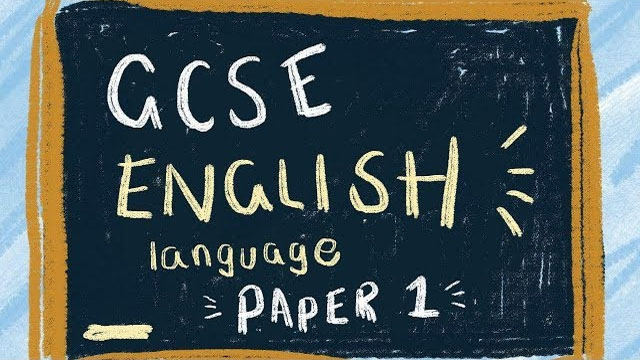GCSE English
GCSE English – Subject content:
Students will draw upon a range of texts as reading stimulus and engage with creative as well as real and relevant contexts. Students will have opportunities to develop higher-order reading and critical thinking skills that encourage genuine enquiry into different topics and themes.
This specification will ensure that students can read fluently and write effectively. Students will be able to demonstrate a confident control of Standard English and write grammatically correct sentences, deploying figurative language and analysing texts.
For GCSE English Language students should:
Read fluently, and with good understanding, a wide range of texts from the 19th, 20th and 21st centuries, including literature and literary non-fiction. Students will also be required to write fiction and non-fiction texts within the boundaries of set text formats.
They should be able to:
- Read and evaluate texts critically and make comparisons between texts
- Summarise and synthesise information or ideas from texts
- Use knowledge gained from wide reading to inform and improve their own writing
- Write effectively and coherently using Standard English appropriately
- Use grammar correctly and punctuate and spell accurately
- Acquire and apply a wide vocabulary, alongside a knowledge and understanding of grammatical terminology, and linguistic conventions for reading, writing and spoken language
- Listen to and understand spoken language and use spoken Standard English effectively.
GCSE English Language is designed on the basis that students should read and be assessed on high-quality, challenging texts from the 19th, 20th and 21st centuries. Each text studied must represent a substantial piece of writing, making significant demands on students in terms of content, structure and the quality of language.
The texts, across a range of genres and types, should support students in developing their own writing by providing effective models. The texts must include literature and extended literary non-fiction, and other writing such as essays, reviews and journalism (both printed and online).

Assessment Objectives:
Assessment objectives (AOs) are set by Ofqual and are the same across all GCSE English Language specifications and all exam boards.
The exams and Spoken Language endorsement will measure how students have achieved the following assessment objectives.
- AO1: identify and interpret explicit and implicit information and ideas while selecting and synthesising evidence from different texts
- AO2: Explain, comment on and analyse how writers use language and structure to achieve effects and influence readers, using relevant subject terminology to support their views
- AO3: Compare writers’ ideas and perspectives, as well as how these are conveyed, across two or more texts
- AO4: Evaluate texts critically and support this with appropriate textual references
- AO5: Communicate clearly, effectively and imaginatively, selecting and adapting tone, style and register for different forms, purposes and audiences. Organise information and ideas, using structural and grammatical features to support coherence and cohesion of texts
- AO6: Candidates must use a range of vocabulary and sentence structures for clarity, purpose and effect, with accurate spelling and punctuation.
- AO7: Demonstrate presentation skills in a formal setting
- AO8: Listen and respond appropriately to spoken language, including to questions and feedback on presentations
- AO9: Use spoken Standard English effectively in speeches and presentations.
Paper 1: Explorations in Creative Reading and Writing
Section A: Reading
• one literature fiction text
Section B: Writing
• descriptive or narrative writing
Assessed
• written exam: 1 hour 45 minutes
• 80 marks
• 50% of GCSE
Questions
Reading (40 marks) (25%) – one single text
• 1 short form question (1 x 4 marks)
• 2 longer form questions (2 x 8 marks)
• 1 extended question (1 x 20 marks)
Writing (40 marks) (25%)
• 1 extended writing question (24 marks for content, 16 marks for technical accuracy)
Paper 2: Writers’ Viewpoints and Perspectives
Section A: Reading
• one non-fiction text and one literary non-fiction text
Section B: Writing
• writing to present a viewpoint
Assessed
• written exam: 1 hour 45 minutes
• 80 marks
• 50% of GCSE
Questions
Reading (40 marks) (25%) – wo linked text
• 1 short form question (1 x 4 marks)
• 2 longer form questions (1 x 8, 1 x 12 marks)
• 1 extended question (1 x 16 marks)
Writing (40 marks) (25%)
• 1 extended writing question (24 marks for content, 16 marks for technical accuracy)
Non-examination Assessment: Spoken Language
What’s assessed
(AO7–AO9)
• presenting
• responding to questions and feedback
• use of Standard English
Assessed
• teacher set throughout course
• marked by teacher
• separate endorsement (0% weighting of GCSE)

Learning Outcomes for Functional Skills Levels 1 & 2:
Functional Skills English qualifications at these levels indicate that students should be able to speak, listen, communicate, read and write clearly, accurately, confidently and with effectiveness.
Students will learn how to:
- Listen, understand and make relevant contributions to discussions with others in a range of contexts
- Apply their understanding of language to adapt delivery and content to suit audience and purpose
- Read a range of different text types confidently and fluently, applying their knowledge and understanding of texts to their writing
- Write texts of varying complexity, with accuracy, effectiveness, and correct spelling, punctuation and grammar
- Understand situations within which planning, drafting and using formal language are important, and when they are less important
Students should be able to use these functional skills autonomously, applying them to a range of formal and informal contexts, in the workplace and real life.
A key aspect of developing knowledge and skills in English, at Level 1 and Level 2, is to be able to communicate with confidence, effectiveness and with an increasing level of independence.
Assessment Specifications:
All skill areas are assessed. Specifications are developed to ensure 100% coverage of the criteria and consistency/reliability of assessments over time.
Reading:
Designed for on-screen assessment delivery, with the option of a paper-based assessment. The assessment is task-based, involving multiple choice questions and free responses.
Each assessment contains two different types of source document. The assessment tasks will require candidates to extract relevant information from the documents.
Writing:
Designed for on-screen assessment delivery, with the option of a paper-based assessment.
The assessment is task-based, involving free response writing.
Each assessment requires candidates to produce two different types of text to fulfil the purpose of the task.
Speaking, Listening and Communication:
The assessment consists of two group discussions. One discussion will be about a topic that is familiar to the candidates, and the other will be about a topic that is unfamiliar to the candidates.
Topics are decided by the centre. Assessments are conducted by the centre and assessed internally.
Get in Touch
Phone
01795 476450
info@kite-college.org
Address
Unit 1 Bonham Drive, Eurolink Business Park, Sittingbourne, ME10 3RY



